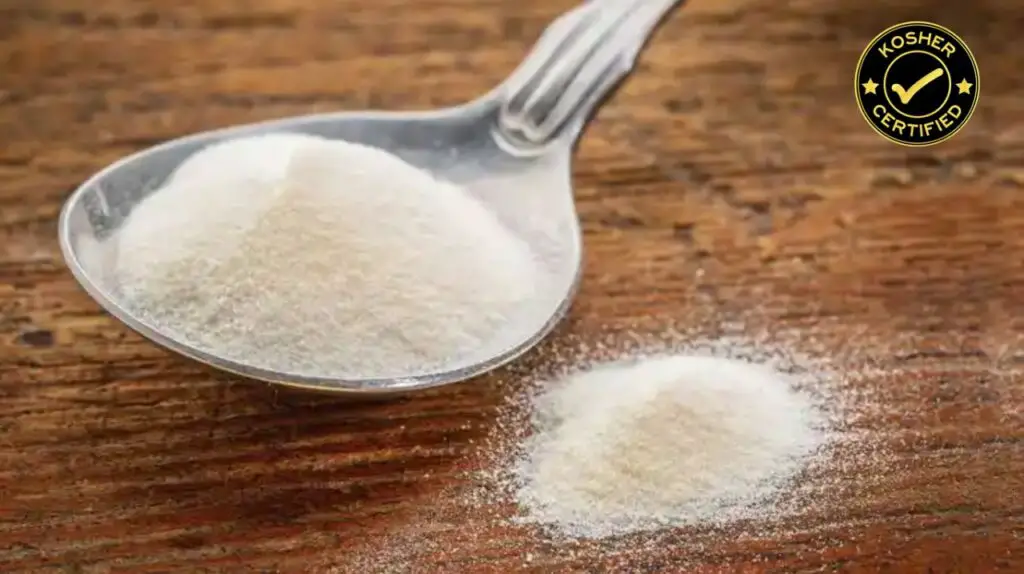Let’s dive into a topic that puzzles many: “Is Kosher Gelatin Halal?” It’s a question that pops up often, given the distinct dietary laws of Islam and Judaism. Halal, in Islam, sets the standards for permissible eating, while kosher defines what’s fit according to Jewish law. But when we encounter products like gelatin with a kosher label, it throws us into a bit of a loop. Can something kosher automatically be considered halal?
In this article, we’re going to unravel this mystery. We’ll explore the basics of what makes food halal or kosher, get to know how gelatin is made, and discuss whether kosher gelatin fits into a halal diet. This journey is for anyone looking to align their dietary choices with their faith’s teachings or simply curious about navigating these dietary waters. So, if you’re ready to get to the bottom of “Is Kosher Gelatin Halal?” you’re in the right place. Let’s get started and shed some light on this intriguing subject.
Decoding Dietary Laws: Navigating the Halal and Kosher Foodscapes
Diving into dietary laws, let’s start with halal. In Islam, halal means permitted or lawful. Foods that fit this bill are safe for Muslims to eat. It’s not just about avoiding alcohol and pork; the way animals are treated and slaughtered matters too.
Switching gears to kosher, this is what folks in the Jewish community look for. Kosher laws are detailed, especially about meat and dairy. Like halal, the source of the meat and how it’s processed play huge roles.
Now, let’s talk gelatin. It’s everywhere – in sweets, medicines, and more. But what is it? Simply put, gelatin comes from animal bones and skins. Its source is key to whether it’s considered kosher or halal.
Gelatin’s Journey from Animal to Ingredient
Gelatin’s story begins with animal parts, specifically bones and skins. In the USA and the UK, these often come from cows or pigs, but fish and poultry are also sources. The transformation of these parts into gelatin is quite a process.
Here’s how it goes: First, these animal bits are thoroughly cleaned. Next, they’re cooked slowly. This cooking breaks down collagen, a protein found in the tissues, turning it into gelatin. Once cooled, this mixture becomes the gelatin we use in foods and products.
For gelatin to be kosher, it needs to come from an animal that’s kosher-certified, meaning it fits Jewish dietary laws. It must also be slaughtered and processed according to kosher regulations. Similarly, for gelatin to be considered halal, the animal must be permissible under Islamic law, and its slaughter must adhere to halal guidelines.
In both the USA and the UK, the distinction between kosher and halal sources is crucial. This background sets the stage for understanding why the source and processing of gelatin matter deeply when determining if it’s halal or kosher.
Kosher Certification and Gelatin
When we talk about gelatin being kosher, it’s all about meeting strict standards. In both the USA and the UK, kosher certification means the gelatin comes from an approved source and follows Jewish dietary laws. This involves a detailed check from sourcing to processing.

Kosher gelatin often comes from fish or kosher-slaughtered beef. The certification process is thorough. A rabbi or a Jewish certifying agency inspects the production process to ensure everything complies with kosher rules. They look at the type of animal, how it was slaughtered, and how the gelatin was extracted and processed.
But here’s where it gets interesting for those following a halal diet. Just because gelatin is kosher doesn’t automatically make it halal. For Muslims, the animal also needs to be halal – meaning it’s permissible under Islamic law and slaughtered according to Islamic guidelines.
Also Read: Can Whey Protein Be Halal?
Is Kosher Gelatin Halal?
Here’s the big question: “Is kosher gelatin halal?” The short answer is, it depends. In both the USA and the UK, the answer hinges on the source of the gelatin and its processing.
Kosher gelatin that comes from fish or halal-slaughtered beef could be considered halal. However, if it’s derived from non-halal sources, like pigs or animals not slaughtered according to Islamic law, then it’s not halal.
Islamic dietary laws require that animals be treated humanely and slaughtered with a swift, single cut to the throat while invoking the name of Allah. This process differs from some kosher slaughtering practices, which might not always align with halal requirements.
For Muslims in the USA and UK, the safest bet is to look for gelatin products with clear halal certification. This ensures the gelatin not only comes from a permissible source but also follows the halal slaughtering and processing guidelines.
Practical Advice for Consumers
Finding halal gelatin in the USA and UK can be straightforward with a few tips. First up, always check for halal certification labels. These are your best bet for ensuring the product meets Islamic dietary laws from start to finish.
If you’re eyeing a product with kosher gelatin, dig a little deeper. Find out the source of the gelatin. Fish-based gelatin is generally a safe choice for Muslims. However, if the source is unclear, reaching out to the manufacturer can provide the answers you need.
In today’s market, there are plenty of alternatives to animal-based gelatin. Plant-based gelling agents like agar-agar and carrageenan are great options. They’re widely used, halal by nature, and work well in recipes calling for gelatin.
For those in the USA and UK looking to stick to halal dietary guidelines, the internet is a valuable resource. Many halal certification bodies have online databases listing approved products. Plus, forums and social media groups offer community advice on where to find halal gelatin and substitutes.
FAQs
How can I tell if kosher gelatin is halal?
To determine if kosher gelatin is halal, check the product’s label for halal certification or contact the manufacturer for information on the source of the gelatin. If the gelatin is fish-based or from halal-slaughtered animals, it is more likely to be halal.
Are there halal alternatives to gelatin?
Yes, there are several halal alternatives to animal-based gelatin, including agar-agar, which is derived from seaweed, and carrageenan, sourced from red algae. These plant-based gelling agents are naturally halal and can be used in a variety of recipes.
Why is the source of gelatin important in determining if it’s halal?
The source of gelatin is crucial because Islamic dietary laws specify that only certain types of animals are permissible, and they must be slaughtered in a specific, humane way while invoking the name of Allah. Gelatin from animals not meeting these criteria, or from forbidden animals like pigs, is not halal.
Ending notes
To wrap things up, understanding whether kosher gelatin is halal comes down to knowing the source and how it’s processed. In the USA and the UK, not all kosher gelatin fits the halal criteria, especially if it’s from non-halal sources or not slaughtered according to Islamic guidelines. For those following a halal diet, checking for halal certification is key. It’s a surefire way to ensure your gelatin meets the strict standards of Islamic dietary laws.
If you’re ever in doubt, remember, that alternatives like agar-agar and carrageenan are great substitutes. They’re plant-based, naturally halal, and work well in your favorite recipes. Staying informed and cautious about your choices helps maintain a diet that’s true to your religious and ethical values.
So, next time you come across a product with kosher gelatin, take a moment to consider its source. With a bit of research and the tips we’ve shared, you can confidently navigate your dietary choices, ensuring they align with your halal lifestyle. Happy eating!

